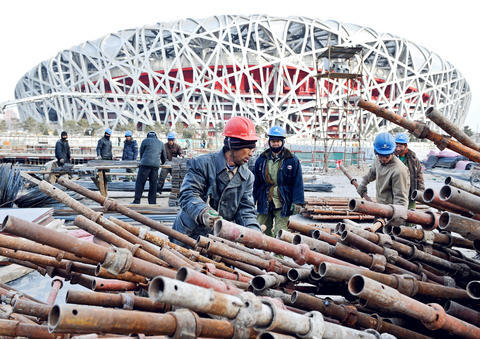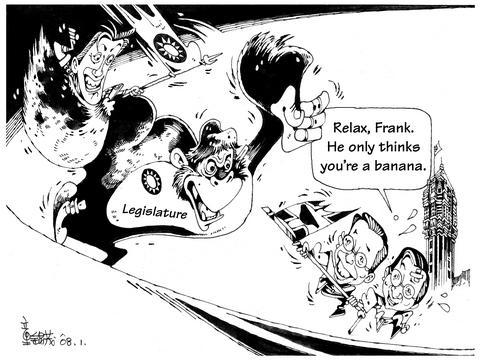MOFA
condemns Chinese action at WHO board meet
By Jenny W. Hsu
STAFF REPORTER, WITH CNA
Wednesday, Jan 23, 2008, Page 1
China ambushed the nation's allies on the Executive Board of the WHO by robbing
them of the opportunity to speak up for Taiwan, the Ministry of Foreign Affairs
said yesterday.
El Salvador, Paraguay and Sao Tome and Principe had jointly proposed a draft
resolution calling for the International Health Regulations (IHR) of 2005 to be
extended to include non-members like Taiwan.
The bill, which was initially scheduled for consideration during yesterday's
meeting of the 122nd session of the WHO's Executive Board, was successfully
blocked by China after it unexpectedly requested that its review be advanced to
Monday 10 minutes before the day's meeting was to conclude, when most of the
bill's sponsors were absent.
"We strongly condemn China for disregarding the health rights of Taiwanese. We
also protest against the WHO for ignoring our allies' right to speak on behalf
of their draft resolution," ministry spokeswoman Phoebe Yeh (葉非比) said.
Yeh said China has never cared about the health of Taiwanese, as shown by its
failure last year to inform Taiwan of a shipment of potentially toxic corn from
Thailand.
She said Paraguay had yesterday proposed an amendment stipulating that all
countries must be included in the framework in order to prevent gaps in global
efforts against disease.
Quoting the "universal application" clause within the IHR, Paraguay said China
had no legitimate authority to represent Taiwan's health interests.
Yeh told the Taipei Times that representatives from San Tome and Principe and El
Salvador had also condemned Beijing's claim to represent Taiwan's health
interests.
Belize, although not a board member, also spoke in favor of Taiwan.
At press time, the meeting had not been adjourned.
It was reported that China also proposed its own amendment in an effort to block
Taiwan's representation in the health agreement. Sri Lanka and Djibouti seconded
China's motion.
Shen Lyu-hsun (沈呂巡), the nation's representative to Geneva, said the incident
showed that China's suppression of Taiwan had intensified. He protested what he
called the unfair ruling by WHO Executive Board Chairman Balaji Sadasivan in
rejecting the bill, saying Beijing had wielded its influence to sabotage
Taipei's chance.
"Unless the WHO does something about it, Taiwan will remain a gap in the global
disease surveillance system after the Executive Board meeting concludes," Shen
said.
During Monday's meeting, Li Baodong (李保東), China's permanent representative to
the UN in Geneva, said the draft resolution had challenged the "one China"
principle. He said that with statehood as a prerequisite for implementation of
the IHR, Beijing had already stated last May that the IHR applies to the "entire
territory of the People's Republic of China, including ... the Taiwan Province."
An April agreement between Beijing and the WHO on Taiwan's role in the IHR
stipulated that China's National Focal Point would handle routine IHR matters
through existing cross-strait health communication channels, Li said.
|
|
| FISH SWORD Chen Ching-ho, head of the management committee of the Chihhe Temple in Hsinchu County, yesterday shows a large ``shark sword'' made of pieces of shark's heads. According to legend, the sword (which is 1.5m long and weighs 5kg) came to Taiwan on a ship that was found floating off Taiwan's northwest coast in 1770.
|
China to probe reported stadium deaths
AFP AND AP, BEIJING
Wednesday, Jan 23, 2008, Page 5
 |
| Workers mingle at
a construction site in front of the National Stadium in Beijing
yesterday.
|
China pledged yesterday to investigate a report that officials covered up the
deaths of at least 10 workers building the main stadium for the Beijing Olympics
in August.
Britain's Sunday Times newspaper alleged that the workers died as safety
standards slipped during a rush to complete the 90,000-seat National Stadium,
known as the Bird's Nest.
"This is the first I have heard of this," Li Yizhong (李毅中), China's work safety
minister, told a press conference.
"I will ask the Beijing work safety watchdog to conduct an investigation and if
this is found to be the case, severe punishment will be administered according
to the law," he said.
The Sunday Times cited several unnamed witnesses to the deaths and alleged that
officials had paid unusually high amounts of compensation to silence the
families of dead employees.
Officials have never admitted to a single death on any of the dozens of Olympic
construction sites.
DISMISSAL
Earlier, Sun Weide (孫維德), spokesman for the Beijing Olympics organizing
committee, dismissed the report as untrue.
He said safety standards were rigorous and there was no rush to complete any
venues for the Games, which run from Aug. 8 to Aug. 24.
Of the 37 arenas, 36 have already been finished while the National Stadium is
scheduled to be completed by April.
"Construction of the National Stadium is going according to plan and under
proper safety standards," Sun added.
Li called on people and the media yesterday to expose workplace accidents in a
bid to use public pressure to ferret out the corruption and official misdeeds
aggravating the country's high rate of work deaths.
Li said public whistle-blowing provides crucial clues needed by investigators,
who are often hobbled by cover-ups by local officials, especially on accidents
that occur in coal mines.
"We welcome the public's supervision. We welcome the reports made by people to
expose corruption," Li told reporters at a news conference. "According to some
tips, for example, we have found government officials who made unlawful
investments in coal mines."
BAD RECORD
China has a woeful if improving record on safety, with 111,480 deaths in
accidents last year. Chinese coal mines are the world's deadliest, with 3,786
miners killed, a figure that marks a 20 percent improvement from 2006.
However, the figure is believed by experts to understate casualties as mine
owners and officials hide accidents to avoid costly investigations and
penalties.

Kurt
Campbell ON TAIWAN: Common yet different democracies
Wednesday, Jan 23, 2008, Page 8
Last week, newspapers in New Hampshire and Taiwan -- thousands of kilometers
apart and meant for vastly different audiences with completely different
cultures and political traditions -- carried eerily familiar pictures. In one, a
despondent Democratic Progressive Party (DPP) supporter was seen somewhat in
shock after the results of the legislative elections were announced, which saw a
rout of the DPP at the hands of rival Chinese Nationalist Party (KMT)
candidates. The picture was accompanied by a story of what this would mean for
the presidential election in March.
At the same time, a Nashua, New Hampshire, newspaper carried a very similar
picture of a deflated supporter of Representative Barack Obama trudging
dejectedly through the thick snow after Hillary Clinton's surprise upset in the
Democratic primary.
While there is much that separates the US and Taiwan -- very different
histories, national aspirations and worldviews -- there are still important
things that unite them. The US and Taiwan each possesses among the most active
and participatory democracies in the world and the intensity of the two
presidential campaigns are cases in point.
There has been extensive discussion of late of a worrisome drift in the
US-Taiwan relationship and there are indeed signs of discord and clear areas for
worry.
President Chen Shui-bian's (陳水扁) seemingly insatiable push for a referendum on
joining the UN has drawn particular ire from the Bush administration. So too
have persistent disagreements about defense spending and participation in
international institutions created occasional tensions between Washington and
Taipei.
These instances of disagreement and discord take place amid the background of
China's dramatic rise to great power status. It is undeniable that China now
plays a much larger role in Washington's calculation on virtually every matter
of global importance, from North Korean nuclear weapons to currency woes to
energy anxieties to unrest in Pakistan.
The US now needs a constructive partnership with China as never before, which
has resulted in Taiwan feeling increasingly squeezed by the growing weight of
China in all matters of international diplomacy and commerce.
Nevertheless, what is often forgotten behind the banal bromides that celebrate
the vibrancy of Taiwanese democracy is that the US and Taiwan share a common
experience of democracy, including all its many disappointments, difficulties
and dilemmas that cannot be easily ignored.
Indeed, national leaders who are regularly subjected to the difficult discipline
of polling stations and voting booths understand each other at some very basic,
core level.
While US officials often claim to be mystified by a Taiwanese move or maneuver
on an issue related to identity or national character, the truth is that deep
down, Americans of virtually every stripe understand the motivations behind
initiatives that at the same time are seen as disruptive or even dangerous.
What is sometimes forgotten in the occasionally tense to and fro between
Washington and Taipei is that unlike the previous era of US-Taiwanese diplomacy,
when national authorities could act with much less concern about public scrutiny
or opposition, the current leaders must be much more responsive to public
sentiment and criticism.
While it is true that, on occasion, Taiwanese leaders have taken steps that went
against the advice given by Washington, these initiatives were usually
undertaken with a specific domestic group of supporters in mind. In a sense,
this is the essence of democracy.
The challenge for this and the next generation of US and Taiwanese leaders will
be to better appreciate the pressures and interests of the other. For the US
president, it will mean a simultaneous desire to maintain a stable and durable
understanding with China while at the same time seeking to preserve Taiwan's
security and democracy.
For the Taiwanese president, it will mean negotiating a complex path between
domestic expectations for greater national identity and international standing,
while taking account of the obvious desires of both Beijing and Washington to
avoid actions that could trigger a crisis.
Clearly, Washington and Taipei will have their hands full, but in the complex
trilateral dialogue and diplomacy between Washington, Taipei and Beijing, it is
clear that the common experience of democracy has created inevitable and
undeniable connections between Taiwan and the US that cannot and should not be
ignored. Indeed, it is these values, along with other strategic interests, that
keep the US so closely engaged in the Western Pacific.
So, as presidential campaigning continues in the US and Taiwan, it is important
to keep these common political experiences in mind while both sides negotiate a
complex future together.
Kurt Campbell is the chief executive officer and cofounder of the Center for
a New American Security.